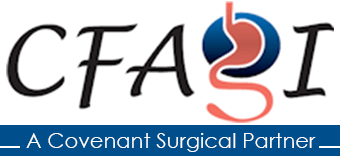WE’RE HERE
TO HELP YOU
Acid Reflux (GERD): Causes and Treatments
Many people have to deal with mild acid reflux or heartburn from time to time. Also known as gastroesophageal reflux disease (GERD), it occurs when stomach acid flows back into the esophagus from the stomach. A circular band of muscles called the lower esophageal sphincter (LES) is located at the opening where the esophagus leads into the stomach, and normally, the LES is open only when food or liquid is being swallowed.
This valve prevents stomach acid from flowing back the wrong way, so if it relaxes or weakens at the wrong time, acid reflux can occur. As the stomach acid comes in contact with the lining of the esophagus, it can cause severe pain and discomfort that feels like a burning sensation in the chest or throat. Acid reflux can also cause the regurgitation a food and unpleasant liquid, and in some cases even make it difficult to swallow.
What triggers acid reflux?
GERD is a complex medical condition that can be triggered by many potential factors, some of which may occur simultaneously. That said, one of the most common factors with acid reflux is being overweight. And while the science is unclear about why excess weight is linked to GERD, one theory is that it puts pressure on the abdomen, which in turn puts pressure on the LES, causing it to weaken.
Certain foods and eating habits can also trigger GERD, including:
- Greasy, fatty foods. Foods high in fat, especially high in saturated fat, take longer to digest. That means the food stays in the stomach longer and the stomach produces more gastric acid, increasing the likelihood that it will flow backward through the LES.
- Spicy food. While the science is unclear, there is plenty of anecdotal evidence that spicy food can make the symptoms worse if you already have acid reflux. Because the acid irritates the lining of the esophagus, the tissue becomes raw so it’s like putting jalapeno juice on an external cut or scrape. Cayenne, chili powder, curry, and black pepper are among the foods that can cause problems.
- Caffeine. Whether it’s in coffee, tea, or soda, caffeine can cause the LES to relax, allowing other food and liquid into the esophagus. Additionally, caffeine can stimulate an increase in the production of stomach acid.
- Alcoholic beverages. Alcohol in any form can make it difficult for your body to clear acid out of the esophagus. This is especially true when you lie down after having a few drinks. Plus, if you mix alcohol with something high in acid, like certain fruit juices, it can make the acid reflux even worse.
- Overeating. When you eat a large meal to the point of feeling full, your stomach expands. This puts pressure on the LES and, if it happens repeatedly over a long period of time, causes long-term damage. Plus, large meals stimulate the production of more stomach acid.
What you should do.
Mild acid reflux can usually be managed with a few lifestyle changes and the occasional use of over-the-counter medications. Clearly, losing weight will help if you have a few extra pounds or more. Also, avoiding some of the known trigger foods will help bring the symptoms of GERD under control.
If you experience heartburn and it’s accompanied by pain in other areas of the chest, or in your arm or jaw, call 911 immediately because this could be signs of a heart attack. You should make an appointment with a physician if your symptoms are severe or if you have frequent episodes of acid reflux. For example, if you are taking OTC heartburn medication more than twice a week, you should see a doctor.
The Center for Advanced Gastroenterology
At the Center for Advanced Gastroenterology, we have dedicated our practice to providing effective diagnostic and treatment solutions for issues of the upper and lower gastrointestinal tract and liver for our patients. These issues include such conditions as:
- Viral hepatitis
- Irritable bowel syndrome (IBS)
- Crohn’s disease
- Persistent diarrhea
- Rectal bleeding
- Acid reflux/GERD (gastroesophageal reflux disease)
- Gastritis/abdominal pain
- Hemorrhoids
- Constipation
- Severe nausea
- Ulcerative colitis
Convenient Locations and Caring Staff
In addition to the treatment we provide, we are also committed to your physical and emotional comfort. We have six locations throughout Central Florida for your convenience, and our highly specialized physicians and clinical staff members take the time to listen to you and make sure you understand your diagnosis and any treatment we may prescribe.
Procedures Offered
The procedures we offer include:
- Diagnostic colonoscopy
- Colon cancer screening
- Upper endoscopy
- Capsule endoscopy
- Banding of internal hemorrhoids
Schedule Your Care Today!
Your health is too important to delay. We have worked hard to safely reopen our doors, and our team is ready when you are. To request an appointment, please complete the form at right and our team will contact you to schedule your visit.
As it relates to COVID-19, we are committed to the health, safety & wellbeing of our patients, associates and physicians. As the country begins to reopen and elective procedures are again permissible pending local regulations, we have instituted specific practices and procedures to ensure the health and safety of everyone in our facility.
At this time, we are only seeing patients in-person that are presumed COVID-19 free and/or are not showing any symptoms of the virus. Please refer to our COVID-19 guidelines for additional information and context. Thank you for your understanding and cooperation as we navigate current conditions in the best interest of the health and safety of all.
Tell us a little about you, and we will reach out to schedule your visit.
Now Offering Virtual Consultations

